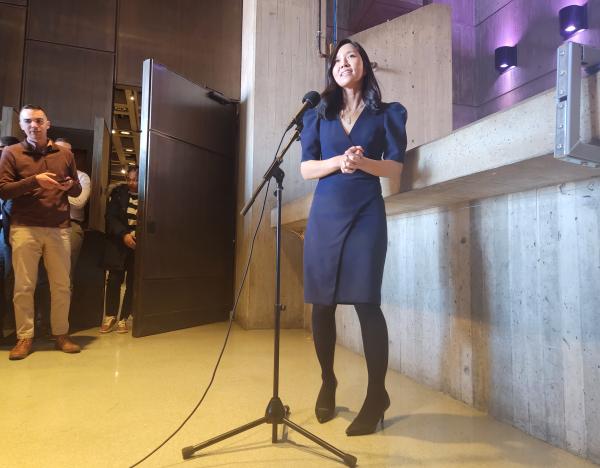March 8, 2023

Mayor Wu spoke to reporters after the City Council's votes on her proposals on rent control and the Boston Planning and Development Authority. (Gintautas Dumcius photo)
City councillors on Wednesday okayed Mayor Michelle Wu’s proposal to bring rent control back to Boston. Once Wu signs the measure, the home rule petition heads to the Legislature, and requires approvals from the state House, Senate and the governor before becoming law.
The proposal caps rent increases at a maximum of 10 percent a year. Wu, in pitching the proposal, cited similar measures in place in California and Oregon. Rent control has been banned in Massachusetts since a 1994 ballot question, though just Boston, Brookline and Cambridge had the policy in place at the time.
Councillors also voted to approve Wu’s changes to the Boston Planning and Development Agency (BPDA), another home rule petition.
Formally still named the Boston Redevelopment Authority (BRA), the quasi-public agency was rebranded as the BPDA under Mayor Marty Walsh. Wu’s proposal abolishes the BRA, and formally renames it the BPDA as BPDA staffers are moved onto the city payroll through the annual budget process.
Wu said the proposal modernizes the legal language that defines the mission of the agency, shifting from the 1960s era focus on getting rid of “urban blight and decay” to taking into account climate resiliency and housing affordability.
With the votes, both of them 11-to-2 tallies, councillors handed a quick pair of victories to Wu, who campaigned on rent control and abolishing the BPDA in 2021. Rent control had the support of three-quarters of Boston voters in a poll during the mayor’s race conducted for the Reporter, WBUR and the Boston Foundation, and the BPDA has long served as a punching bag for mayoral candidates and neighborhood groups unhappy with developers.
Wu said the rent control measure, which made it through the Council unchanged from her original proposal even as it took some heat from the liberal and conservative wings of the 13-member body, protects residents from “extreme price gouging.” The measure also exempts owner-occupied small buildings.
“The reality is the vast majority of good landlords are not increasing their rents by more than 10 percent a year because they know that’s a bad strategy for them to make money,” she said.
According to District 5 Councillor Ricardo Arroyo, who represents parts of Mattapan and shepherded the measure through the Council, 55 percent of rental units in Boston would be affected. The proposal initially drew skeptical notes from the 13-member Council’s conservative and liberal wings for going too far or not far enough.
In the end, District 3 Councillor Frank Baker and At-Large Councillor Erin Murphy, both from Dorchester, were the only ones in the “no” camp for both votes.
In explaining his “no” vote on rent control, Baker pointed to the Wu administration’s other efforts to increase fees on developers through the BPDA development process. Baker argued city officials were adding layers of bureaucracy on developers and landlords as the real estate industry has created generational wealth for the city’s middle class.
“It’s not easy being a landlord, especially a small landlord,” he said, while acknowledging a 10 percent cap is “kind of fair.”
But others, like District 4 Councillor Brian Worrell, who represents Dorchester and Mattapan, said rent control will provide residents and landlords with predictability and stability as the region faces a housing crisis, driven by high demand and low housing supply.
“This is going to help level the market,” added At-Large Councillor Ruthzee Louijeune of Mattapan.
“You know you’re doing something good when the real estate industry is so scared,” she added, accusing rent control opponents of sending a “tracker” to one of her events to record what she told constituents.
Greg Vasil, CEO of the Greater Boston Real Estate Board, which has launched a campaign to block rent control from passing, said he was “disappointed but not totally surprised.” He said opponents are focused on a “long game.”
“As the bill makes its way to Beacon Hill, we are prepared to expand the Rent Control Hurts Housing campaign to educate voters and legislators on the serious harm rent control will have on the residents of the Commonwealth,” he said in a statement after the Council’s vote. “We look forward to promoting pro-housing policies focused on decreasing red tape, additional costs, and regulatory burdens, while increasing production as the path to overcoming the state's affordability crisis."
Speaking with reporters after the City Council meeting, Wu reiterated that some opponents are “fear-mongering” about her proposal and said the 11-2 vote on rent control, grants her administration a “full runway” to engage in conversations with state lawmakers.
Material from the State House News Service was used in this report.


